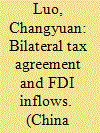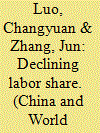| Srl | Item |
| 1 |
ID:
187860


|
|
|
|
|
| Summary/Abstract |
This paper explains the changes in the composition of the source countries or regions of FDI in China from the perspective of taxation. Based on FDI data from 2003 to 2012, the empirical test, employing the difference-in-differences (DID) model, shows that, after the implementation of the tax agreement between the mainland and Hong Kong in 2007, FDI from Hong Kong increased significantly. After the integration of domestic and foreign-funded enterprise income tax systems in 2008, Hong Kong capital inflows increased even more drastically. The extended analyses show that, the substantial increase in Hong Kong capital after the implementation of this bilateral tax agreement was partly related to the diversion effect of investment. MNCs might have diverted investment from other tax havens to the mainland via Hong Kong, resulting in a sharp increase in the amount and proportion of Hong Kong investment, whereas those of FDI from other tax havens have declined.
|
|
|
|
|
|
|
|
|
|
|
|
|
|
|
|
| 2 |
ID:
099907


|
|
|
|
|
| Publication |
2010.
|
| Summary/Abstract |
This paper explores why labor share in China has declined since the middle of the 1990s. Existing literature usually ascribes the labor share decline in developed countries to biased technological progress. However, our investigation shows that China's case is different. Using a simultaneous equation model estimated with three-stage least squares, we find that FDI, levels of economic development and privatization have negative effects on the labor share. The negative influence of FDI on labor share results from regional competition for FDI, which weakens labor forces' bargaining power. A U-shaped relationship exists between labor share and the level of economic development, and China is now on the declining part of the curve. The negative effects of privatization on the labor share stem from the elimination of the so-called "wage costs eroding profit" situation and the positive supply shock on the labor market.
|
|
|
|
|
|
|
|
|
|
|
|
|
|
|
|
| 3 |
ID:
153056


|
|
|
|
|
| Summary/Abstract |
This paper examines the economic value of country image from the perspective of export prices through matching the CEPII export price data with the British Broadcasting Company country image data from 2006 to 2013. The estimation results show that positive country image has an “elevating” effect and negative country image has a “depressing” effect on export prices. The results also indicate that the lower the level of economic development of an export or import country, the stronger the export price effect of country image. As distances between export countries and trading partners increase, the elevating effect of positive country image on export prices becomes weaker. However, the depressing effect of negative country image does not become weaker over greater distances. We find that export prices are depressed by negative country image to a greater degree for China than for other countries. Therefore, it is necessary for China to prevent the occurrence of incidents detrimental to country image.
|
|
|
|
|
|
|
|
|
|
|
|
|
|
|
|